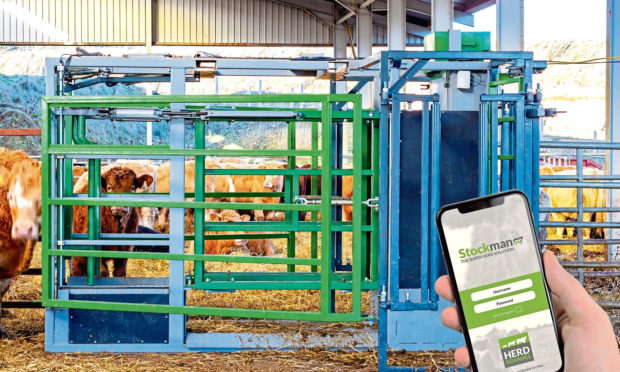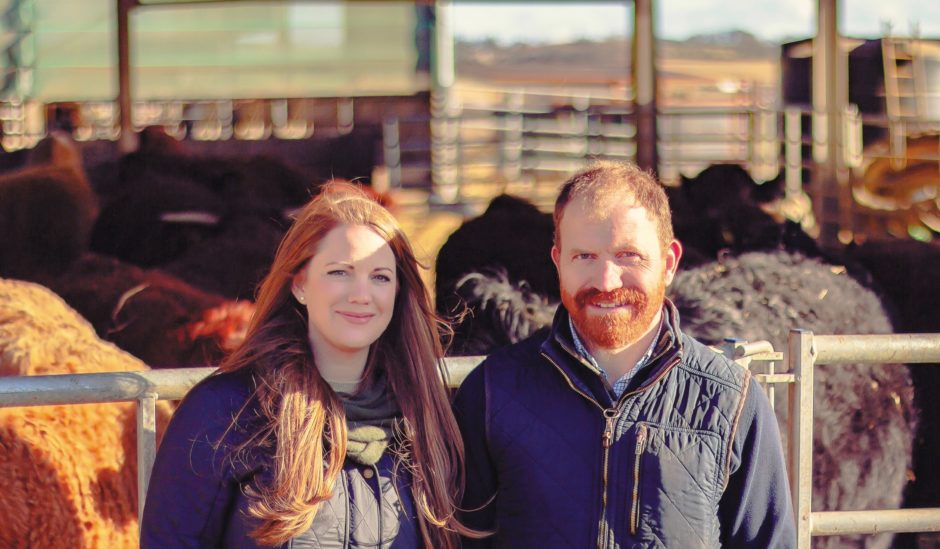An Aberdeenshire digital agri-technology business is celebrating after winning a prestigious award for its integrated cattle monitoring and handling system.
Murdoch Duncan and Jilly Grant are the team behind Herd Advance – a company launched to develop and market the innovative Stockman system.
The system, which recently won a silver award at this year’s Royal Highland and Agricultural Society of Scotland’s (RHASS) technical innovation awards, aims to help farmers safely monitor and handle their cattle.
The Stockman prototype has successfully been trialled on Murdoch’s family farm near Insch, which is home to a herd of 100 suckler cows, and the couple are preparing to offer the system for sale to other farmers towards the start of next year, following final design completion.
“Murdoch has had the idea for the Stockman system in his head for a number of years. From working daily with the cattle he saw the need for an integrated monitoring and handling system,” said Ms Grant.
“There are a number of systems out there that can do parts of the process, but there wasn’t a single system that could monitor, handle and sort cattle without manual involvement.”
The system, which can be used both indoors and outdoors, operates using electronic identification (EID) tags on cattle.
It comprises a water trough in a crate with a weigh-scale and a thermal imaging camera. Every time an animal goes for a drink its weight, the amount of water it drinks, and its temperature is recorded.
The system then allows the animal to exit through one of four gates, giving farmers the option to let the animal go back to its original pen or one of three other pens depending on the sort criteria decided by the farmer and applied through a smartphone app or by the system’s own smart alerting abilities.
Ms Grant said the system records and stores the individual animal’s data 24/7, which can then be accessed through an app on a farmer’s mobile phone providing real-time health and performance analysis of their herd.
The couple have successfully used the system to wean calves from their mothers, draw cattle for market based on a specific weight criteria selected and more generally to monitor the performance and health of their animals.
Ms Grant said improved farmer safety was a major benefit of the system.
“One of the key issues in our industry, and in particular in working with livestock, is the lack of available labour and people who are willing to work with livestock,” added Ms Grant.
“It supports and fills that labour gap.
“Instead of having two or three people to pull cattle out to go to the auction mart, you put your criteria into the system and it sheds the cattle off into your chosen pen without stress to the cattle or handler.”
She said the system was entirely driven by cattle’s need to drink, providing a stressless environment for the cattle when handling and weighing.
Mr Duncan said: “What surprised us in developing and testing the Stockman was just how relaxed and stress-free the cattle are with it.”
He said data gathered on weights, water intake and temperature offered a range of performance monitoring benefits, from being able to flag any animals that are unwell before they show visible signs of illness, to being able to predict when an animal will be ready for slaughter and being able to fine-tune its nutritional needs.
On future plans, Mr Duncan said Herd Advance is working with ScotEID – the national body which manages the database for recording animal movements in Scotland – to integrate its Stockman system with the body’s database.
And looking further ahead, Ms Grant said she hoped the system would help give farmers access to data to endorse their environmental credentials and increase efficiencies to aid planning within the beef supply chain and meet consumer demands.
She said: “The carbon footprint and sustainability of the beef sector is a critical issue, and we as a sector are going to have to be able to prove ourselves.
“The monitoring and the individual performance data we can gain from the system will go some way in supporting that.”

